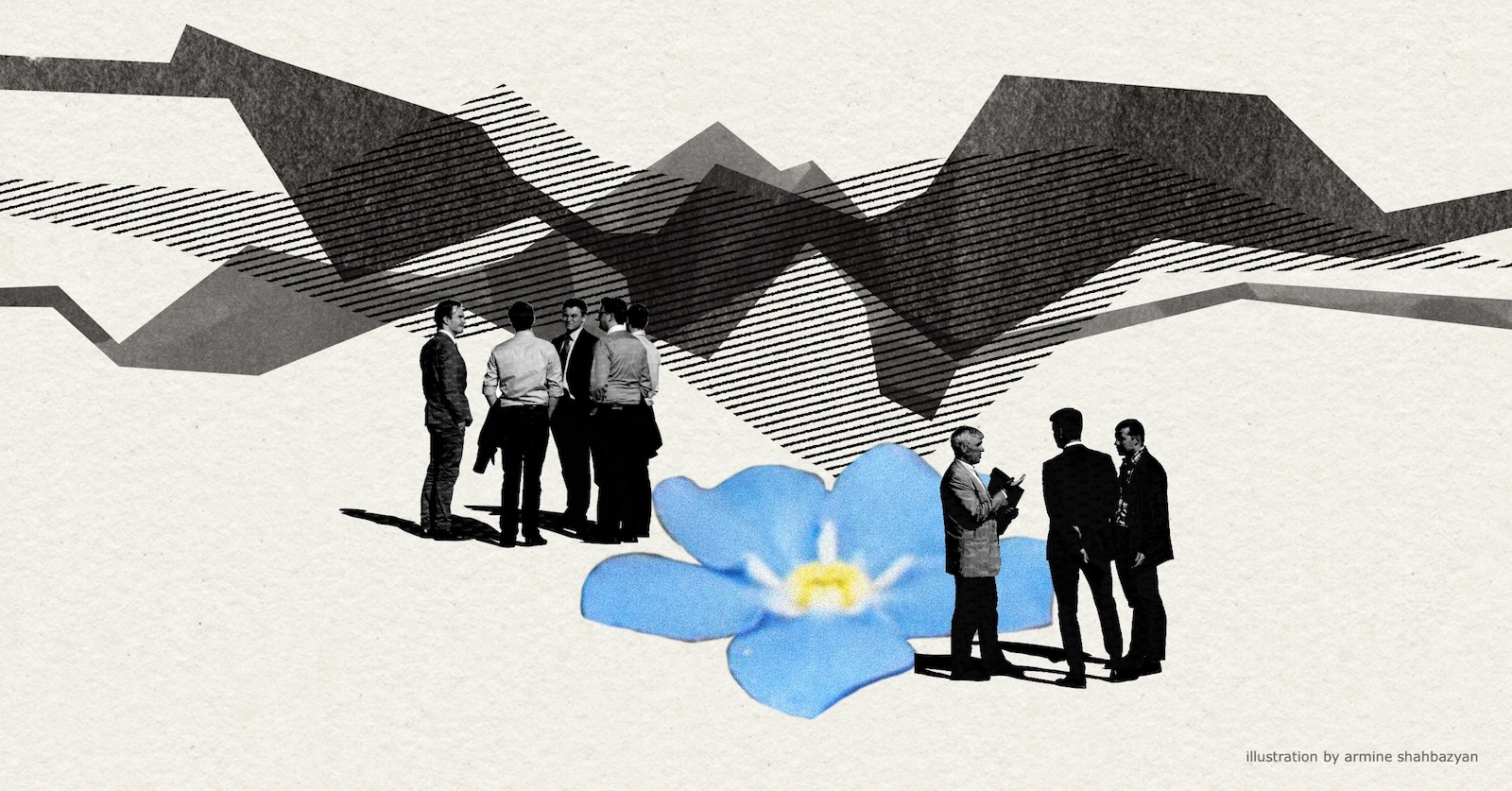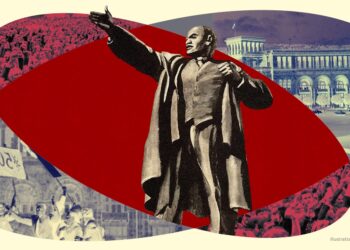
Going forward, all English language articles on EVN Report will have audio versions.
Listen to the article.
On the evening of March 20, the Coordinating Council of Armenian Associations in France (CCAF) held its traditional annual dinner for the ninth consecutive year in a Paris neighborhood. This dinner took place in a thoughtful atmosphere, given the seriousness of the broader geopolitical context and the gravity of the threat to Armenia following the fall of Artsakh and the subsequent ethnic cleansing. The question remains: What concrete actions can France take for deterrence and sanctions against Azerbaijan?
The ethnic cleansing in Artsakh significantly influenced French political figures from all sides, including extreme left to extreme right, increasing their number from the previous year. Present at the dinner were notable figures such as presidential candidate Jean Luc Mélenchon, Prime Minister Gabriel Attal, Defense Minister Sébastien Lecornu, Foreign Affairs Minister Stéphane Séjourné, Housing Guillaume Kasbarian, including government spokesperson Patricia Mirallès. Former President François Hollande, mayor of Paris Anne Hidalgo, mayor of Marseille Benoit Payan, as well as numerous senior political leaders, intellectuals and journalists.
The famous writer Sylvain Tesson and journalist Jean Christophe Buisson, both prominent figures in the French Armenophile movement, shared their experiences from their recent trip to Armenia with the 300 guests. Deeply moved by their encounters with refugee families from Artsakh, they emphasized the responsibility to protect Armenia and remember the Armenian people, which they view as a fate worse than death. Tesson said, “While a European leader says ‘never again’, a Turkish leader says ‘let’s start again’ and an Armenian says ‘here they go again’ (…) We cannot be at the Tatev monastery one day and at the Chamber of Commerce of Baku the next.”
Gabriel Attal expressed deep emotion regarding the plight of the Armenians. Having attended this dinner for seven years in various roles, he took this year’s “opportunity to speak as Prime Minister.” He noted that “the history of the Armenians is that of suffering, resistance and happy tomorrows.” Despite past tragedies, the Prime Minister affirmed that “even if tears were shed, the Armenian people never submitted,” always maintaining their dignity.
“The bond between our two peoples is ancient and the strongest it has ever been. France stands in solidarity with the suffering people. The only divide is that of justice and humanity,” he said, citing the recognition of the genocide and the recent homage to the Manouchians at the Pantheon as proof of France’s support for Armenia and Armenians.
Acknowledging the significant contribution of French-Armenians to France, Attal stated, “I know what we owe French-Armenians.” He also honored the CCAF, which represents the voice of the Armenian diaspora in France.
Finally, Attal revealed his personal connection to Armenia, attributing it to his roots in Issy-les-Moulineaux, a city with a large Armenian population, and his family background. “I am the son of a Jewish father and an Orthodox Christian mother,” he said. “I found the weight of the genocide, but also the aura in the churches when I went to the one on Daru Street.” This confession created a moment of profound silence in the room.
Gabriel Attal began the second part of his speech with a political tone. He asserted “the necessary sovereignty of Armenia,” recalled that “France condemned the choice made by Azerbaijan to use force in Artsakh,” and stated that these images had “outraged” the French. He briefly touched upon Paris’s subsequent actions, such as the convening of the United Nations Security Council, “a scenario hindered due to the complacent attitude of Russia which allowed it to happen. Russian peacekeeping forces let this happen to punish Armenia, which had chosen democracy and the rule of law.” A speech directly addressed to the Ambassador of the Russian Federation, present in the room who remained impassive.
“Armenians must be able to return to their homes in peace. Baku must comply with the International Court of Justice’s order dated November 17, 2023 regarding the situation in Nagorno-Karabakh,” stated the French Prime Minister. France, he continued, has contributed 30 million euros to support refugees from Artsakh. “The primary goal of my government is to assist Armenia in defending its full sovereignty and preserving its territorial integrity. Azerbaijan must withdraw its forces from its positions in Armenia. Russia can no longer aid in peace. Azerbaijani forces must leave Armenia and France can work towards peace!”
Today, France’s support extends beyond diplomacy with an enhanced European mission, the initiation of a support plan, and the EU-Armenia partnership on Emmanuel Macron’s agenda. There is also a military mission established at the French embassy in Armenia. Consequently, the Prime Minister aims to “support the strategic development” of this bilateral relationship.
David Vardanyan, son of philanthropist and impact investor Ruben Vardanyan, who is imprisoned by Azerbaijan, followed the Prime Minister in receiving the CCAF medal. In his acceptance speech, David reflected his father’s dedication, despite initially disagreeing with his decision to settle in Stepanakert.
“[My father] always told me that when faced with a challenge, you have three options: First, To withdraw; Second, to let it happen and adapt; or third, act according to your values and try to initiate change,” David said. “How can we credibly support Armenia if we cannot free the prisoners? I strongly believe that supporting Armenia and the Armenians today means doing everything possible to free these men, including my father, who are detained for no other reason than having helped their people. I call on everyone to mobilize for the prisoners, especially before COP 29 in Baku. We must unite our efforts now to enable the release of all.”
Long Overdue Actions
Undoubtedly, the ethnic cleansing in Artsakh and the existential threat to Armenia were central themes in the speeches. It’s evident that France is the country doing the most for Armenia. Instances of solidarity were mentioned, and proposals were put forward. For example, Xavier Bertrand, the president of the Hauts de Seine region, suggested that “UNESCO send a delegation of international experts to monitor the condition of Armenian heritage.” There were also calls to demonstrate France’s support for political prisoners unjustly detained in Baku’s prisons.
Once the time for emotion and solidarity passes, concrete action is long overdue. However, France seems isolated at the European level, resulting in slow progress. It’s regrettable that the European Parliament did not vote for an amendment requesting the suspension of the gas agreement between Europe and Azerbaijan.
The Franco-Armenian friendship needs more than words of comfort and solemn promises. The situation is urgent due to the power imbalance and the role of Russia, which has ceased to be a protector and an ally of Armenia. While the French army, facing material difficulties and current commitments in several theaters of operation, cannot replace Russia alone nor does it wish to.
French diplomacy plans to consult with European partners, Americans and possibly India, with whom France has a strategic partnership, rather than proceeding alone. In defense of its republican, democratic and humanist values, France must exert enough pressure on Azerbaijan to abandon its projects.
During his speech, Prime Minister Attal did not utter the word “dissuasion” or the word “sanction” once. These are two crucial terms for the Franco-Armenian military partnership to potentially replace the failing Russian alliance and take strong measures against Baku for what happened in Artsakh.
In the words of writer Sylvain Tesson, France must choose between friendship with Armenia and business with Azerbaijan. To date and despite the proven deterioration of relations between Paris and Baku, France has not yet issued any sanctions, despite part of Armenia’s sovereign territory being under Azerbaijani military occupation.
There has been no expulsion of the Azerbaijani ambassador to France, no mention of freezing Azerbaijani assets in Europe, no embargo on hydrocarbon imports, nor any talk of boycotting the next climate conference. It’s clear that promises only bind those who believe in them. The Armenian side must recognize the limits of French commitment and organize accordingly.
Opinion
The Eagle and the Trident
With Zelenskyy’s potential visit to Armenia in the coming days, Justin Tomczyk writes that Ukraine’s experience over the past two years can provide insights into how smaller democracies must fight against their larger, authoritarian neighbors.
Read moreLenin in the Periphery: Self-Determination and Its Discontents
Over 30 years ago, a statue of Lenin towered over the heart of Yerevan until it was dismantled. The recent centennial of Lenin’s death went mostly unnoticed in Armenia but it might have sparked reflection on Lenin’s impact during the Sovietization of Armenia and how his definition of self-determination has had consequences on contemporary geopolitics.
Read moreBetween State and Fatherland: A Tale of Two Mountains
Mount Ararat doesn't stand as an obstacle to building a functional state, and suddenly loving Mount Aragats will not help us achieve our goals. Before we jettison our national symbols en masse, we need concrete plans and state-driven programs to improve the lives of an already beleaguered nation, writes Daniel Tahmazyan.
Read moreCan the West Be a Reliable Partner for Armenia? Part I
While Armenia undertook a “huge strategic shift” toward the West two years ago, the question of the reliability of the partnership with Americans and Europeans remains unresolved, writes Gaidz Minassian.
Read moreCan the West Be a Reliable Partner of Armenia? Part II
In Part II of a two-part series examining Armenia’s pivot to the West, Gaidz Minassian examines the question of the reliability of the partnership with Americans and Europeans.
Read more





